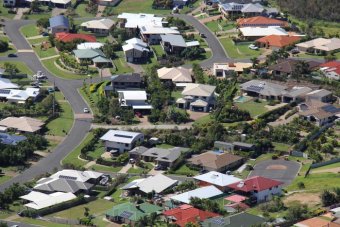Has the era of record low interest rates finally come to an end?
Posted
The Reserve Bank of Australia (RBA) has left interest rates on hold at an historic low of 1.5 per cent, giving no indication that it has any intention of taking the official cash rate any lower.
Key points:
- Some people are already feeling the pinch despite record low interest rates, according to a consumer advocacy group
- "Banks are facing higher costs, in part because of Donald Trump," a banking analyst says
- Over the last 25 years Australians have binged on mortgage debt
The decision was widely expected with all 64 economists polled by Reuters expecting the RBA to keep rates on hold at today's meeting, the last of the year.
According to one Melbourne-based consumer advocacy and campaigning organisation, some people are already feeling the pinch despite record-low interest rates.
"We get about 15,000 calls a year and I'd say about over 50 per cent of those are people having problems with their mortgage payments," Consumer Action Law Centre's service manager Penelope Hill said.
The impact of Trump's spending plan
The RBA may have sat on its hands today, but the big banks have not, with Westpac and NAB this week becoming the latest lenders to target investors by hiking rates.
Morningstar banking analyst David Ellis said "it is certainly more politically palatable to increase interest rates for investor loans".
"I expect the major banks to pass on the increases to owner-occupied loans as well," he said.
"Banks are facing higher costs, in part because of Donald Trump."
Chief economist of Capital Economics Paul Dales said the US President-elect's plans to cut taxes and increase government spending are going to lead to an increase in interest rates in the US.
"He's going to cut taxes and he's going to increase government spending," he said.
"That simply means the American economy is going to grow at a faster rate, which means the American economy needs higher interest rates, and it's that rise in expected interest rates that is pushing borrowing costs up around the world."
Australia's household debt level has skyrocketed
The Reserve Bank has conflicting priorities — it wants to make sure the economy is stimulated but it does not want to fuel a debt binge.
Compared to its global peers, Australia's household debt level has skyrocketed.
Over the last 25 years Australians have binged on mortgage debt, as they heavily invested in property — pushing up prices and leaving households vulnerable to an economic shock.
Ms Hill said people are agreeing to higher interest rates than they are comfortable with to get into the real estate market.
"Many people, particularly because real estate is so hard to get into, will probably be putting themselves at a higher level than is comfortable when there is an interest rate increase," she said.
It has led Mr Dales to conclude that "at some point there will be a day of reckoning".
"It may not come in the next couple of years, or two, but in three years — perhaps when interest rates in Australia rise to what will be more normal levels — I think you might see a little bit more pain where households realise they've taken on too much debt," he said.
And that day of reckoning could have far reaching consequences for households and the economy.
Topics: business-economics-and-finance, economic-trends, money-and-monetary-policy, markets, australia










